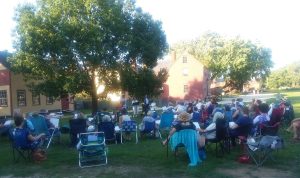A Water from the Well blog post, Parashat D'varim
Written by Rabba Kaya Stern-Kaufman
 This last Friday night was inspiring and uplifting. Thank you to all who came out to the Kabbalat Shabbat service at Strawbery Banke, and all who shared their appreciation, both in person and from afar. I felt so lifted up. It is hard to find the words to express how profoundly moving it was to experience so many of our community gathered in prayer and to receive such support and validation for my work. And the cards … and cards… and cards… each one a jewel.
This last Friday night was inspiring and uplifting. Thank you to all who came out to the Kabbalat Shabbat service at Strawbery Banke, and all who shared their appreciation, both in person and from afar. I felt so lifted up. It is hard to find the words to express how profoundly moving it was to experience so many of our community gathered in prayer and to receive such support and validation for my work. And the cards … and cards… and cards… each one a jewel.
Words are truly so powerful.
This week’s Torah portion begins a new book named simply, D’varim-Words. This final book of Torah begins with the phrase, “These are the words– eileh had’varim – that Moses spoke to the Israelites…”. Thus begins Moses’ farewell speech to the people after forty years in the wilderness and just before they entered the Promised Land. Our sages of blessed memory have pointed out that, forty years earlier when Moses was called upon by God at the burning bush, to be the emissary to Pharaoh, he resisted the task, claiming “Lo ish d’varim anochi – I am not a man of words.” He was so resistant that God responded by appointing Aaron his brother to speak for him to the people. And yet, in an astonishing transformation, forty years later Moses had indeed become a man of words. His farewell speech takes up thirty-three chapters of words.
In the tenth century midrashic commentary, D’varim Rabbah, the rabbis explain this transformation as a healing of the tongue, manifested through learning Torah. After four decades of receiving and learning Torah, Moses underwent a transformation of body and soul. Of this the S’fat Emet (19th cent. Hasidic Master) states:
The Holy Blessed One said: See how the language of the Torah is so dear that it heals the tongue! From where do we know this? Since it is written, “A healing tongue is a tree of life,” (Proverbs 15:4) and the “tree of life” only refers to the Torah, as it is said, “it is a tree of life to those who grasp onto her” (Pro. 3:18). The language of the Torah liberates the tongue.
Later, the S’fat Emet qualifies this statement by adding the following: Moses our teacher represented the collective wisdom of all of Israel. Therefore, so long as the Israelites were not ready [to receive God’s words], Moses was not “a man of words… (S’fat Emet, D’varim 1877)
In other words, it was not only that Moses underwent a healing of the tongue but that the people became able to listen. As long as the Israelites were not ready to hear, his words of Torah could not flow freely. A modern commentator, Erin Leib Smokler writes the following:
Moses’ journey toward words, then, was not a move from silence to speech, but from isolation to solidarity, from a ruptured relationship to a repaired one. When the people’s openness to hearing met Moses’ openness to speaking, then d’varim, words, spilled forth… A be’er, a wellspring of creativity and devotion…
Language may be understood, then, to have two powers: to bring an individual into speech and to connect people to one another…Moses could only speak once he has access to words worth speaking, i.e. Torah. (But also) Moses could only speak to a group once they had openness to words they deemed worth hearing.
Not to compare myself to Moses, of course, but Torah surely does present us with archetypal relationships from which to draw learning and understanding. The experience of teaching and listening is a powerfully reciprocal phenomenon. As a speaker and teacher, I often marvel at the way different groups or classes pull different ideas and teachings from me. Even on an individual level, there are encounters that seem to draw forth different aspects of wisdom from the chemistry created between the two. In Hebrew the words for teaching (l’lamed) and learning (lilmod) come from the same root, for they are intimately bound in reciprocal relationship.
On a personal note, I want you to know that my experience of gathering with you all last Friday night and receiving your open-hearted words of appreciation helped me to know that my words these past two years are landing in receptive ears and that my work here in Portsmouth is meaningful. This was your greatest gift to me as it allows me to see that we have indeed created a circuit that opens up the wellsprings of Torah, enlivening and strengthening us all. Thank you!
August 3,2022